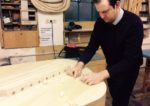Piano Maker’s Corner: How I Came To Be A Phoenix Technician
The story of how Doug Chapman came to be a piano technician determined to let the world know that British pianos are again up there with the best.
 Being Piano Technician at Phoenix Pianos is my dream job. Being able to work on some of the world’s finest pianos, as well as look after other big name brands in our showroom, is an absolute honor. I often liken it to a mechanic being offered the job at Ferrari. It’s that big.
Being Piano Technician at Phoenix Pianos is my dream job. Being able to work on some of the world’s finest pianos, as well as look after other big name brands in our showroom, is an absolute honor. I often liken it to a mechanic being offered the job at Ferrari. It’s that big.
Now for a little bit of history about piano building in the UK. Back in the 1930’s, there were parts of London with a piano factory on every corner. Camden Town, for example, had over 100 small factories, employing around 6000 people. Gradually though, the industry went into decline, finally ending with the close of the Kemble factory in Milton Keynes, which was owned by Yamaha, in 2009. It was a sad day for the British piano industry.
This sad state of affairs did not last long though. Fast forward 7 years and I’m very proud that, once again, Britain is creating pianos. Not only that, but I’m a part of it! Still though, people don’t realize that buying British is even an option. The big names in the industry appear to many to be the only choice, particularly for concerts. Indeed, I didn’t even know it was a choice myself until I stumbled upon my new job. The story goes like this:
Some years ago, I took my family up to London for the day, where we visited the world famous department store, Harrods (think Macy’s with even more history). I have fond memories of my mum taking me there every summer holiday when I was younger to visit the “Piano Room”. It was stacked with world famous grand pianos – I was fascinated by their size, power and, let’s be honest, how shiny they were. This time however, I knew it would be different. Armed with my knowledge and experience from being a technician, I was looking forward to seeing things from a new viewpoint.
I walked out of the lift (elevator to many of you) and looked around. “I’m sure it’s here”, I said to my wife. But it wasn’t. There was a digital piano on a display stand and that was it. No pianos. I immediately did what I always do in a moment of crisis and confusion. I turned to Google for help.
“Harrods shuts lid on piano departments as sales drops” was the first search result. It turns out the showroom had recently closed for good. Although I was very disappointed about this, my negative feelings very quickly changed for the good. I read on: “Britain now has just a handful of piano manufacturers, including John Broadwood & Sons, in Goudhurst, Kent, Hurstwood Farm Piano Studios in Borough Green, Kent, and Cavendish Pianos, a two-year-old firm in Bolton Abbey, Yorkshire”
I knew about Broadwood and their deep historical significance. Being born and raised in Kent, I was at one time approached by their owner to see if I was interested in becoming a trainee technician, as they were planning to go into production, with the Kemble-Yamaha factory providing the frames and casework. However, when they closed the factory, these plans were scuppered. Broadwood never really recovered, and has since moved north. Cavendish was exciting to me too, but a long way away from where I live.
The manufacturer that truly interested and confused me, was Hurstwood Farms in Borough Green. Hurstwood was 20 minutes from my house, yet, I had never heard of them. My piano parts supplier was in Borough Green, yet somehow I had no idea that pianos were being built 5 minutes away.
Their technician had retired only 3 weeks earlier, and they were in need of someone new. Possibly the best timed email ever.
I sent Hurstwood Farm an email, first of all to find out more about what they were doing, but also to offer my services as a technician. This, of course, would be futile or so I thought. They would surely have a technician already. The response? Their technician had retired only 3 weeks earlier, and they were in need of someone new. Possibly the best timed email ever. Weeks later, I was appointed technician and the rest, as they say, is history.
Being technician for the world’s most technologically advanced piano manufacturer is not easy, but I love a challenge. As you’ve seen from previous articles, the technology used in our Phoenix piano is very different from what a technician is used to. Learning how regulate a carbon fibre action, tune with the sparkling harmonics created by the bridge agraffes, adjusting hydraulic pedal mechanisms: it’s been a steep learning curve, one that I’ve loved every second of.
Another part of my job at Phoenix is looking after the digital side of things, including the social media updates and website maintenance. I take this job very seriously. In this day and age, if you have no web presence, you may as well not exist. I am absolutely determined to ensure that concert pianists, teachers and other professionals, as well as amateurs around the world know that they can choose a British piano once again. After all, why choose just one make of piano? Where’s the variety? Guitarists don’t all play with a Fender or Gibson. The same guitarist might use 4 or 5 different guitars during the same concert. Why should a concert pianist be tied to the same piano for every piece, every composer, every concert?
Of course, trying to convince people in our industry to change their habits of a lifetime is not easy especially given the power and money behind the big brands. But, here on Hurstwood Farm, in a little village in the Kent countryside, we’re making big waves in the world of pianos. Long may it continue.
There are a lot of crazy things happening in the UK at the moment, as you may have read. No one really knows what’s going to happen in the near future. But one thing is for certain: We Brits still know how to make a world class piano and we want the world to know about it.


